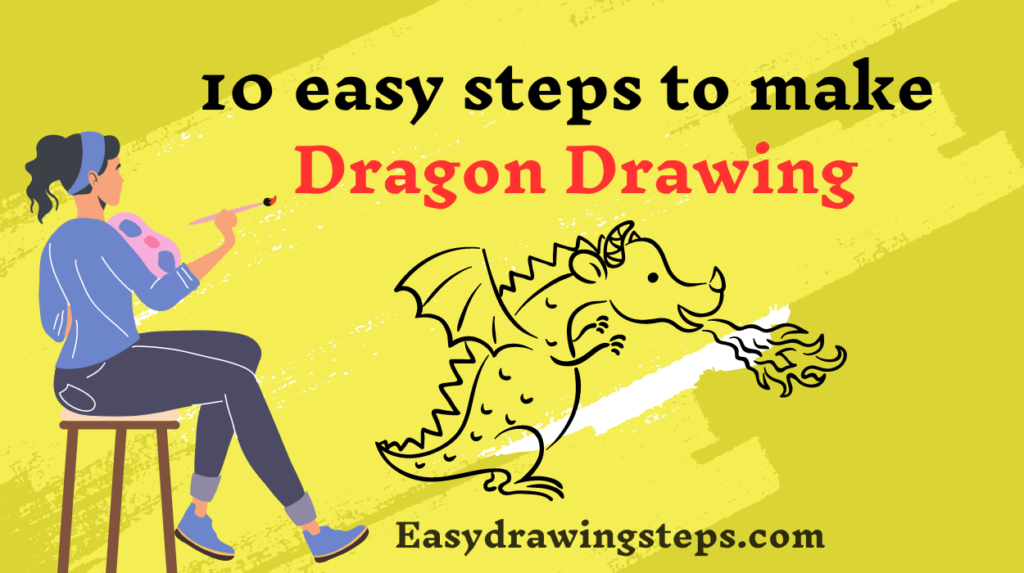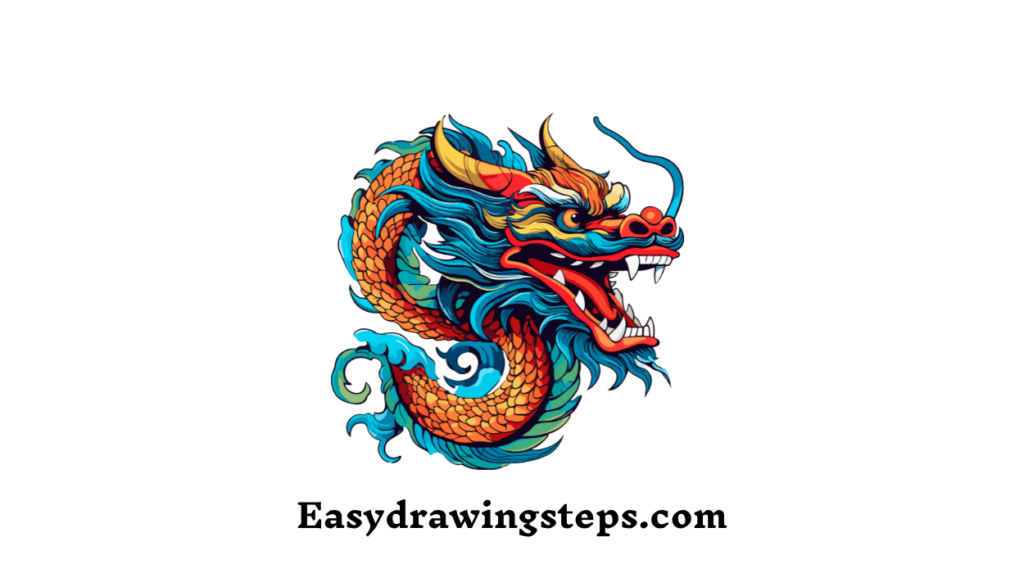
Dragon Drawing : Drawing a dragon can be an exciting and creative challenge, whether you’re a beginner or an experienced artist.
This step-by-step guide will help you create an impressive dragon drawing, from a simple sketch to a more detailed and realistic portrayal.
We’ll cover various styles, including traditional and Chinese dragon drawings, to give you a comprehensive understanding of how to bring these mythical creatures to life on paper.
Step 1: Gather Your Materials for Dragon Drawing
Before you begin, gather all necessary materials. You will need paper, pencils (HB, 2B, and 4B are good choices), an eraser, and possibly colored pencils or markers if you want to add color.
Also Read : 10 easy steps to draw Skull Drawing
Step 2: Draw Basic Shapes
Start your dragon drawing by sketching basic shapes. Draw a large oval for the body, a smaller circle for the head, and another oval for the tail. Connect these shapes with simple lines to form the rough outline of the dragon’s body.
Step 3: Outline the Head and Neck
Refine the shape of the head by adding details such as the snout and jawline. Draw a curved line from the head to the body to create the neck. For a Chinese dragon drawing, extend the neck to be longer and more serpentine.
Also Read : 10 easy steps to draw Powerball Drawing
Step 4: Add the Limbs
Sketch the dragon’s limbs by drawing simple shapes for the legs and arms. Use elongated ovals for the upper limbs and smaller ovals or circles for the joints. Connect these shapes with lines to form the basic structure of the limbs.

Step 5: Draw the Wings
For dragons with wings, draw large, triangular shapes extending from the back. Add lines to indicate the wing structure, similar to a bat’s wings. For an easy dragon drawing, you can keep the wing shapes simple and straightforward.
Also Read : 10 Easy Steps to Draw Pink Dolphin Drawing
Step 6: Define the Tail
Extend the tail from the body, using the oval shape you sketched earlier as a guide. For a realistic dragon drawing, add curves and details to the tail, such as spikes or scales, to make it look more dynamic.
Step 7: Add Facial Features
Focus on the dragon’s face by adding eyes, nostrils, and a mouth. For a more ferocious look, add sharp teeth and horns. For a Chinese dragon drawing, give the dragon distinctive whiskers, a beard, and long, flowing eyebrows.
Also Read : 10 easy steps to draw Yoga Day Poster
Step 8: Refine the Body Shape
Go over your initial outline and refine the body shape, adding more details like scales, muscles, and texture to the skin. For a realistic dragon drawing, pay attention to the anatomy and muscle structure to make the dragon look more lifelike.

Step 9: Add Final Details
Enhance your dragon drawing by adding finer details such as claws, additional spikes, and texture to the wings. If you’re drawing a Chinese dragon, include intricate patterns and scales along the elongated body.
Also Read : 10 easy steps to draw easy Zebra Drawing
Step 10: Shade and Color
Finally, add shading to give your dragon drawing depth and dimension. Use your pencils to create shadows and highlights, and blend the shading for a smooth transition. If you’re using colored pencils or markers, choose colors that enhance the dragon’s features and make it stand out.
Tips for Different Dragon Drawing Styles
- Dragon Drawing Easy: Focus on basic shapes and minimal details. Keep the lines clean and simple for a straightforward representation.
- Chinese Dragon Drawing: Emphasize the long, serpentine body and intricate details like whiskers, beard, and scales. Use flowing lines to create a sense of movement.
- Easy Dragon Drawing: Keep the drawing process simple by using basic shapes and straightforward lines. Ideal for beginners or quick sketches.
- Realistic Dragon Drawing: Pay attention to anatomical details and muscle structure. Add shading and texture to create a lifelike appearance. Study real animals like reptiles for inspiration.
By following these 10 easy steps, you can create a variety of dragon drawings, from simple and easy to detailed and realistic. Practice regularly to improve your skills and develop your own unique style. Happy drawing!
FAQ
What are the basic shapes needed to start a dragon drawing?
To start a dragon drawing, you need to sketch basic shapes such as ovals and circles. Draw a large oval for the body, a smaller circle for the head, and another oval for the tail. Use simple lines to connect these shapes and form the rough outline of the dragon’s body. These shapes provide the foundation upon which you can build more detailed features.
How can I make my dragon drawing look more realistic?
To make your dragon drawing look more realistic, focus on adding detailed features and accurate anatomy. Study the muscle structure and skin texture of real reptiles and incorporate these elements into your drawing. Add shading to create depth and dimension, and use reference images for inspiration. Paying attention to small details like scales, claws, and facial expressions will also enhance the realism of your dragon drawing.
What distinguishes a Chinese dragon drawing from other dragon drawings?
A Chinese dragon drawing is characterized by its long, serpentine body and intricate details. Unlike Western dragons, which often have a more reptilian and bulky appearance, Chinese dragons are depicted with elongated bodies, flowing lines, and elaborate features such as whiskers, a beard, and long eyebrows. They are often shown with a sense of movement and grace, making them distinct from other dragon drawings.
How can I draw dragon wings effectively?
To draw dragon wings effectively, start by sketching large, triangular shapes extending from the dragon’s back. Add lines to indicate the wing structure, similar to bat wings, with a central bone and radiating lines for the wing membrane. For a simple dragon drawing, keep the wing shapes straightforward. For a more detailed drawing, add texture, shading, and small details like veins and claws at the wing tips to make them look more realistic.
What materials are best for drawing a dragon?
The best materials for drawing a dragon include paper, pencils (such as HB, 2B, and 4B for different line weights), an eraser, and blending tools like a blending stump for shading. If you want to add color, colored pencils or markers are ideal. Using these materials will help you achieve various effects, from simple line drawings to detailed and shaded works of art. Reference images can also be very helpful for accuracy and inspiration.


2 thoughts on “10 easy steps to draw Dragon Drawing”